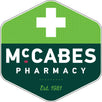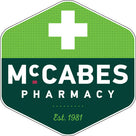How to choose the best hydrating face mask for your skin
When used regularly, hydrating masks will moisturise your skin and help it to look its best. They are also effective as an occasional treatment before a special event or in warm weather, which can dry out the skin.
The great news is that this beauty treatment can be easily carried out at home and on a budget. However, knowing which hydrating face mask to use to suit your skincare routine can be daunting.
In this guide, we’ll help you choose a hydrating mask, talk you through the different types of masks and their ingredients, and answer some frequently asked questions.
Click on a link to jump to that section:
Find out the recommended hydrating face masks for common skin concerns.
Read about the different applications of hydration face masks, including gels, sheets, peel-offs and overnight masks.
Additional factors you need to consider when choosing the right hydration face mask for you.
Frequently asked questions about choosing hydration face masks.
Choosing a hydrating mask for your skin concern
Sensitive skin
If you suffer from sensitive or dry skin, you may be extra cautious about choosing a hydrating facial mask.
It is important to look for natural, non-irritating ingredients such as Vitamin E or aloe vera for a gentle hydration boost. You should also check the label to find a mask that is suitable for sensitive skin.
Recommended product
For a hydrating boost for sensitive skin, try the Garnier Moisture Bomb Camomile Hydrating Face Sheet Mask containing gentle, soothing chamomile and plant serum.
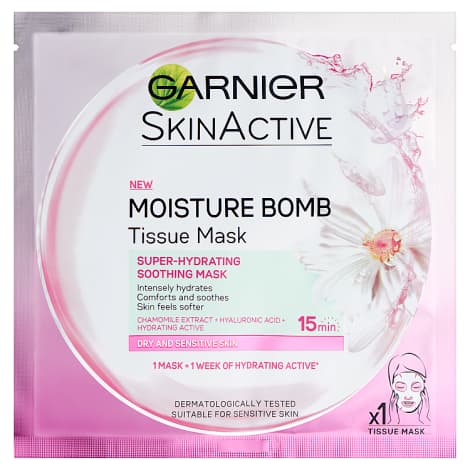
- Soothing mask that intensely hydrates, comforts and soothes
- Skin feels softer
- Ideal for sensitive skin
You can read our full guide to choosing face masks for dry skin here.
Prone to oil or shine
Choose your hydrating face mask carefully if you are prone to oil or shine, to avoid making it more oily. A charcoal, mud or clay mask is the perfect companion to oily skin, delivering a deep cleanse while retaining the skin’s moisture.
Recommended product
For a cleansing treatment which also hydrates, reach for Garnier Charcoal and Black Tea Purifying and Hydrating Face Sheet Mask for Shine Prone Skin. This cleansing and boosting mask also contains hyaluronic acid to plump up the skin.
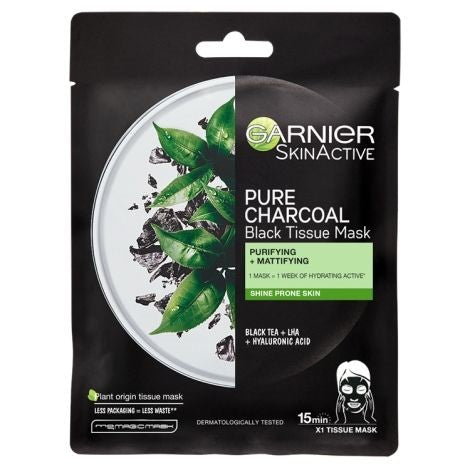
- Garnier pure charcoal sheet mask - a super purifying and mattifying mask for skin prone skin
- The no1 sheet mask brand to intensely rehydrate, purify and refresh shine prone skin
- Enriched with black tea, LHA and hyaluronic acid
- An efficient and convenient solution to purify skin without drying it out
- Skin looks clearer and healthier
Acne-prone skin
Some hydrating masks can clog the pores of acne-prone skin, so look for masks that contain charcoal or clay, known to draw out impurities.
Peel-off masks are a great choice. They work hard to lift the impurities that can cause breakouts and will not dry out the skin or make it feel uncomfortable.
Recommended product
The Biovène Charcoal Bubble Mask ticks all the boxes with activated charcoal to flush out impurities and natural ginkgo Biloba, aloe vera and green tea extracts to brighten and hydrate.
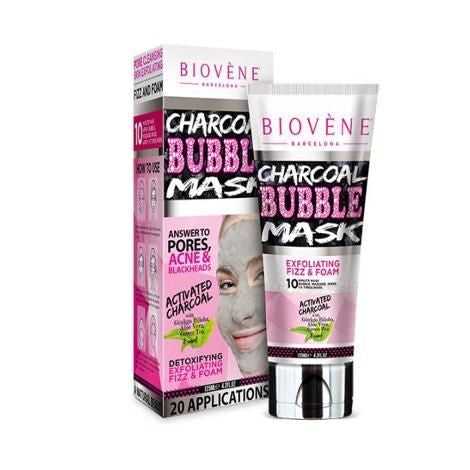
- Infused with oxygen to help the natural key ingredients dive deep into the skin
- Watch as bubbles foam and fizz to remove excess dirt and cleanse pores
Read our guide to choosing face masks for acne here.
A dull or uneven complexion
Cream masks are an excellent choice for brightening the complexion. Their naturally plumping effect can help soften fine lines while delivering deep hydration.
Look for masks with hyaluronic acid on the ingredients list, which attracts moisture and brightens the complexion.
Masks containing Vitamin C are also good for brightening the complexion. Try the Garnier Fresh-Mix Face Sheet Shot Mask With Vitamin C 33g for a brighter and more radiant complexion.
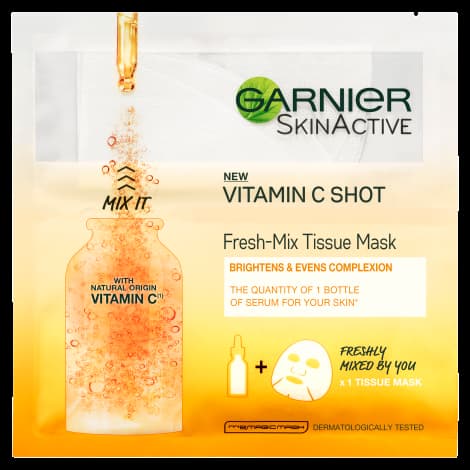
- Brightens & evens complexion
- Enriched with vitamin C
For more advice on choosing a face mask for your skin, read our guide to choosing face masks for skin types and conditions.
Different applications of hydrating face masks
Gel masks
Gel masks are ideal for oily skin as they hydrate without feeling greasy, making a lighter alternative to traditional cream masks.
Recommended product
For a super hydrating gel mask, we recommend the Neutrogena Ageless Boost Hydrogel Recovery Mask, a clever combination of a sheet mask that delivers moisture-boosting gel directly to the skin.
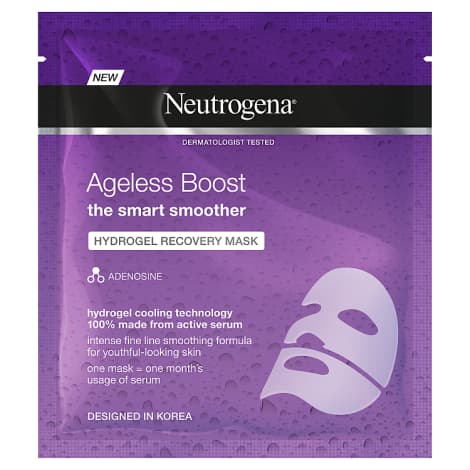
- Contains adenosine
- Non-comedogenic (doesn’t clog pores)
- Suitable for use on sensitive skin
- Dermatologist tested
Sheet
Sheet masks take the form of a cotton sheet soaked in serum which delivers targeted moisture to thirsty skin.
For a sheet mask that refreshes and revitalises the skin, try the Nivea Q10+ Vit C Energy Sheet Mask.
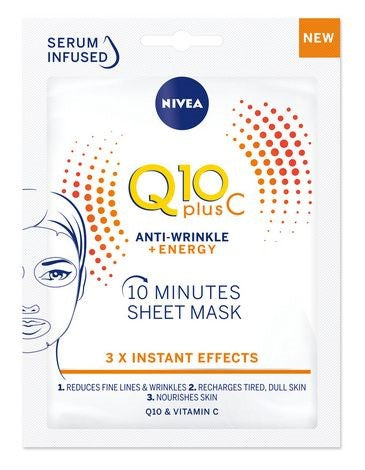
- With Q10 and Vitamin C
- 10-minute sheet mask
- Biodegradable fibre mask
- A super-soft sheet mask that's easy to fit
- Instantly reduces the signs of fatigue
Peel-off
These deep cleansing and hydrating masks do exactly as their name suggests. You simply apply them and carefully peel them off the skin after the allotted time.
Recommended product
The Montagne Jeunesse 7th Heaven Cucumber Peel-Off Mask is perfect for peel-off first-timers.
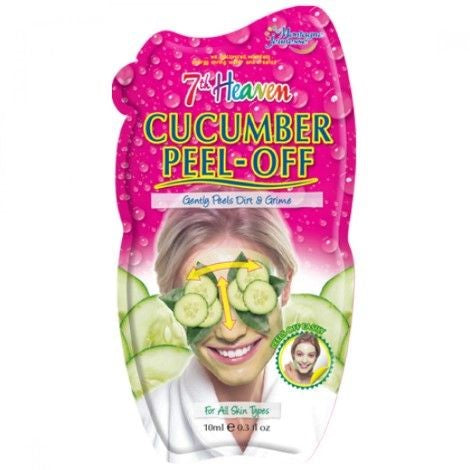
- For normal, oily and t-zone skin types
- Easy to use
- Contains Cucumber extracts
- Gently peels away dead skin cells
Overnight
The beauty of overnight masks is that they can be applied at bedtime and benefit from the restful qualities of sleep when the skin naturally repairs and regenerates.
Recommended product
The Embryolisse Hydra Mask is a versatile product that can be used either as a conventional mask to be rinsed off after 15 minutes, or left on overnight for an intense moisturising effect.
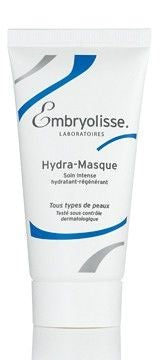
- This moisturising cream mask bathes the skin in moisturising and regenerating active ingredients that plumps in just minutes
- Hyaluronic acid, natural Sesame & Sweet Almond plant oils, and vitamins (A, E and F) regenerate the skin's barrier, smooth the skin, and ensure an optimal level of moisturising
- The skin looks plumper and more toned; it is soft and smooth, and the complexion is fresh and radiant
What else do I need to consider when choosing a hydration mask?
Price range
With the amazing variety of hydrating face masks out there, you can spend as little or as much as you like on this skincare treatment, from as little as a few pounds up to double figures if you’re treating yourself to a premium brand.
How long should I leave the mask on for?
To know how long to leave your hydrating face mask on for, refer to the instructions on the packet. Many masks can be effective in only 10 minutes. If you want to treat yourself to a deeply hydrating experience, why not opt for an overnight mask?
Potential side effects and skin concerns
Be aware that certain ingredients can cause irritation if over-used, for example, Vitamin C and retinol. If your skin is particularly sensitive, hyaluronic acid may also cause redness, itching or swelling.
However, rest assured that the majority of hydrating face masks contain natural ingredients that are unlikely to irritate your skin.
FAQs
Can I use a hydrating mask every day?
This depends on the ingredients. If your face masks contain Vitamin C or retinol, which can irritate the skin in large doses, then stick to a once-a-week regime. Otherwise, use a hydrating face mask as often as you think your skin needs it.
How thick should I apply my face mask?
A little goes a long way, so apply an even layer sufficient to cover your skin. This should be all you need to give your complexion a moisture boost.
How often should I use a hydrating face mask?
If you feel your skin needs a lot of hydration, then two to three times a week is a good routine. If you’re using a hydrating face mask that is also exfoliating, use them no more than twice a week to avoid irritation.
How can I hydrate my face overnight?
Use an overnight mask to deliver intense hydration to dehydrated skin.
How can I hydrate my skin naturally?
Drink at least six to eight glasses of water a day (around 1.5 litres). Take care to use sunscreen before you go outside and eat a diet rich in fruit and vegetables, which will contain many of the natural ingredients your skin needs to keep it fresh.
Should I apply a hydrating mask before or after a shower?
It’s a good idea to apply your hydrating mask after you’ve had a shower when your skin is at its most receptive.
How can I make a hydrating mask at home?
For a basic recipe, mix one tablespoon of Greek yoghurt, one teaspoon of oats and one teaspoon of honey. Apply to the skin for 10 to 15 minutes and rinse off. Your skin will feel smooth, soft and hydrated.
For guidance on applying a face mask, read how to apply different face masks.
